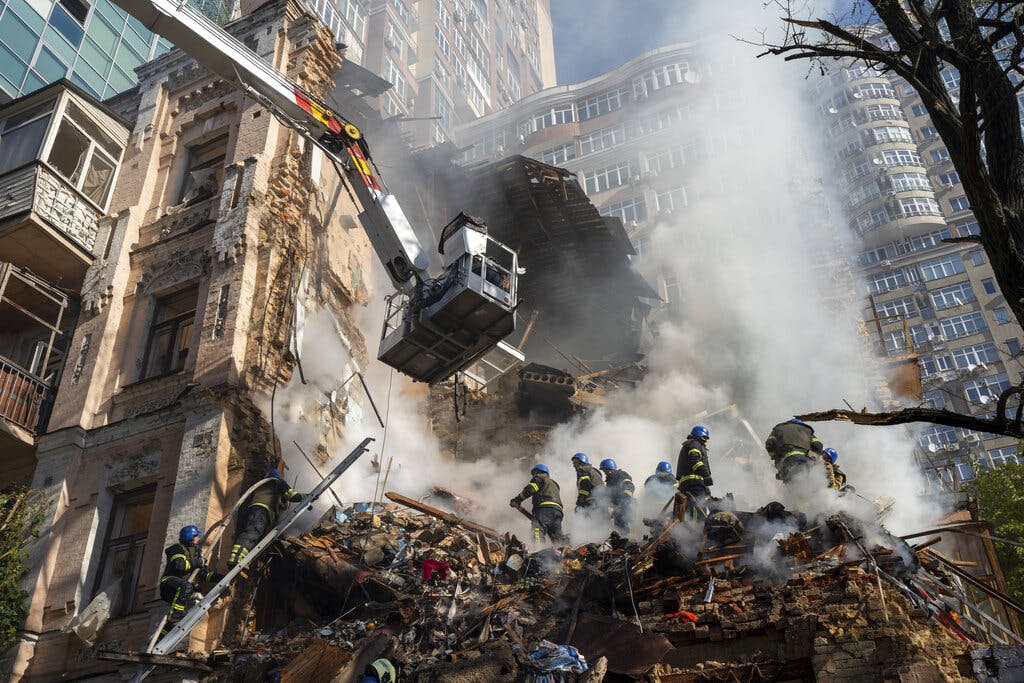EU Envoy’s Caution on Blaming Iran for Role in Ukraine War Raises Questions
Like Japanese soldiers keeping up the fight years after World War II was over, JCPOA hangers-on remain eager to exonerate Iran each time it violates the pact.

Will President Biden reverse his reversal of one of his predecessor’s critical policies? In other words, will today’s drone attacks in Ukraine finally convince Washington to revoke the United Nations resolution that endorsed the 2015 Iran nuclear deal, as President Trump tried to do two years ago?
Russia is using Unmanned Aerial Vehicles to terrorize the civilian populations of Kyiv and other Ukrainian cities. Known as “kamikaze drones,” these UAVs were developed and perfected by Iran and were sold to Russia as part of the ever-tightening relation between the two countries.
Kamikaze drones are slow-moving, remote-controlled devices laden with explosives. For Iran, they are a go-to weapon: Inexpensive to manufacture and used against civilian populations, they are the perfect tool in the terrorist state’s arsenal. Now, Russia is using them to attack Ukrainian cities.
A keen Iran watcher tells the Sun that from social media footage of today’s attack he was able to identify the Shahed 131, Shahed 136, and Mohajer 6 drone models — even as the European Union’s foreign policy tsar, Josep Borrell, says he will seek “hard evidence” for Iran’s role.
Separately, the EU is announcing new travel and other sanctions on several members of the Islamic Republic’s morality police. These are mostly symbolic, as the officials in question never leave Iran and have no foreign assets.
More pointedly, on the eve of a meeting of Europe’s foreign ministers, Paris, Berlin, and other capitals are urging new sanctions against Iran for its sale of the drones to Russia. So why is Mr. Borrel cautiously demanding proof that Iran is a culprit in war crimes in Ukraine?
Despite its clear shortcomings, the 2015 Joint Comprehensive Plan of Action is a near-religious symbol of successful diplomacy in Europe and America. One of the most glaring of those failures is Iran’s proliferation of drones and other conventional arms.
Shortly after that deal was agreed upon between the Islamic Republic and the five permanent United Nations Security Council members and Germany, it was enshrined in a council resolution. That writ contained several “sunset clauses” that promised to gradually remove UN-imposed sanctions against Iran if it complied with the JCPOA’s provisions.
In 2018, Mr. Trump walked out of the nuclear deal and reimposed American sanctions against Iran. At the UN, each of the deal’s original signatories were able to, at any time, trigger a process known as “snapback” to automatically reimpose sanctions, and Mr. Trump was urged at the time to use that mechanism to globalize the American sanctions.
America indeed triggered the “snapback” mechanism at the UN in 2020 when one of the “sunset” clauses threatened to end the UN embargo on the export and import of Iranian non-nuclear arms. Once the embargo expired, the Islamic State would be free to sell weapons legally in world markets.
Mr. Trump’s attempt at averting that danger was laughed at by Security Council members. Russia, China, and the Europeans argued that because Mr. Trump had left the nuclear pact, America no longer could trigger the snapback mechanism. The arms embargo indeed expired, and later, in one of Mr. Biden’s first presidential acts, Washington rescinded Mr. Trump’s snapback motion. Instead, Washington joined the Europeans and Russians in an effort to relaunch the JCPOA.
Now, just as Trump officials warned at the time, Iranian arms exports are threatening the heart of Europe. Yet, even now the EU’s Mr. Borrell — one of the biggest cheerleaders for JCPOA diplomacy — is seeking “hard evidence” of Iranian-made UAVs being used against Ukrainian cities.
Like Japanese soldiers keeping up the fight years after World War II was over, JCPOA hangers-on remain eager to exonerate Iran each time it violates the pact, even though reviving the deal has long proved futile. Diplomatic negotiations are now on ice, as Tehran has withdrawn its diplomats from the Vienna talks.
The UN’s arms embargo against Iran expired two years ago, but Washington and its European allies are arguing that drones, like missiles, remain under a security council embargo. That is why some Europeans are calling for new targeted sanctions to be imposed on Iran.
What happens when the missile embargo expires next year as mandated by one of the sunset clauses?
Mr. Trump attempted to force the UN to do away with the JCPOA in order to prevent Iran from selling arms. Similarly, Washington could now go to the Security Council, trigger the snapback mechanism, and reimpose global sanctions against Iran before the missile embargo expires.
True, such a motion would not end the Rus-Iranian alliance, and President Putin has no qualms about violating UN resolutions. America, as many in Washington advocate, should separately arm Ukraine with effective missile and drone defenses.
Yet, reimposing UN-mandated global sanctions — and burying the JCPOA once and for all — would certainly hurt Iran, as well as Russia. In reviving Mr. Trump’s policy, Mr. Biden could deal a blow to an alliance that threatens Europe and could soon do so to America as well.

